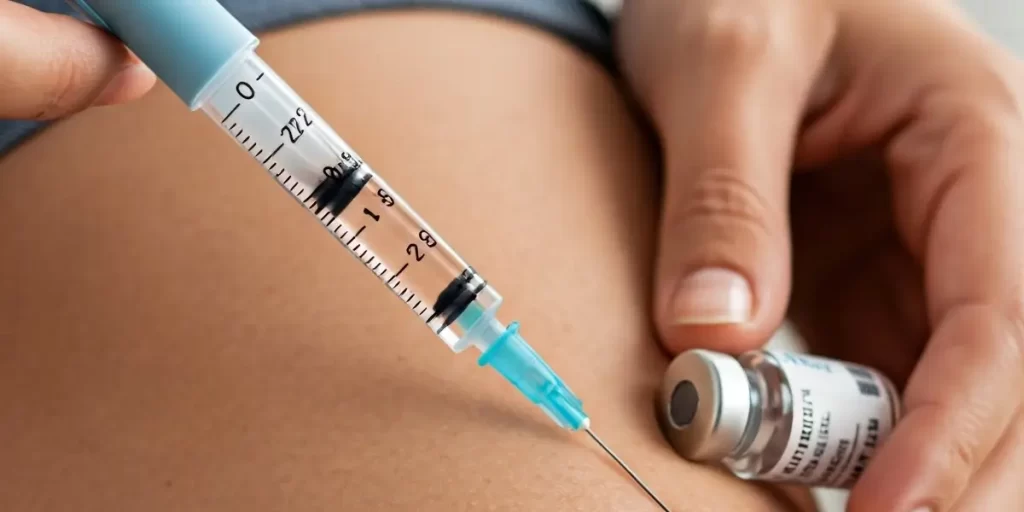What is GLP 1?
GLP 1 is a naturally occurring incretin hormone that is produced in the gut (intestines) of the body. It plays a key role in several physiological processes in your body such as regulating blood sugar levels, promoting weight loss, suppressing glucagon secretion, slowing gastric emptying centers and appetite regulation.
What is the role of GLP-1 in Metabolic Health & Weight Loss Medication?
GLP1 receptor agonists (GLP 1 RAs) are a game-changer in medical weight loss and diabetes management. These drugs help patients achieve sustainable weight loss, improve insulin sensitivity, and lower the risk of heart disease. Semaglutide is a type of weigh loss medication that belongs to the GLP1 class. Therefore it is preferred by Doctors and Clinics for weight loss due to superior efficacy in weight reduction.
GLP 1 medications function by stimulating insulin release during high blood sugar, suppressing glucagon to minimize glucose production, slowing digestion for increased satiety and reduced caloric intake, and decreasing appetite through brain receptor interaction, thereby naturally reducing food consumption.
It also improve heart health and reduce obesity-related risks. Because of these effects, GLP-1 receptor agonists like Semaglutide are used in the treatment of type 2 diabetes and obesity. GLP-1 receptor agonists are medications that mimic this hormone, leading to several beneficial effects

Why are GLP 1 Injections Important for Clinics?
Clinics specializing in weight management and diabetes care are increasingly adopting GLP-1 injections due to their proven effectiveness in inducing significant weight loss beyond lifestyle modifications, substantial improvements in glycemic control for type 2 diabetes patients, demonstrated cardiovascular benefits in select populations, the ability to ensure standardized dosing and administration for enhanced adherence, the opportunity for close patient monitoring and timely therapy adjustments, and the capacity to provide comprehensive patient education on injection techniques, medication storage, and treatment adherence.
How to Prescribe GLP-1 Therapy Safely in Your Clinics?
Prescribing GLP-1 receptor agonists like semaglutide requires careful patient selection, dosing, and monitoring to ensure safety and efficacy. By carefully selecting eligible patients, choosing the right GLP-1 agonist, and monitoring for side effects, you can prescribe GLP-1 therapy safely in your clinic. It is a powerful tool for managing diabetes, obesity, and cardiovascular risks, but it requires proper dosing, patient education, and follow-up care.
Below is a step-by-step clinical guide based on FDA guidelines.
a) Who are the Best Candidates for this Therapy?
GLP1 therapy is suitable for patients with a BMI of 27 or higher who also have obesity-related conditions such as PCOS, diabetes, or hypertension, individuals with type 2 diabetes requiring improved blood sugar control, those struggling with appetite regulation and metabolic disorders, and individuals seeking sustainable, non-surgical weight loss solutions.
b) Who Should Avoid GLP 1 Therapy?
GLP1 therapy is contraindicated for individuals with a personal or family history of medullary thyroid carcinoma, those with severe gastrointestinal disorders such as gastroparesis, patients with type 1 diabetes unless under strict clinical supervision, and individuals with recurrent pancreatitis or gallstones.
c) Factors To Consider While Choosing the Right GLP1 Agent
The selection between different GLP-1 medications is influenced by patient preference regarding daily versus weekly injections, the specifics of insurance coverage which may necessitate prior authorization for drugs like Wegovy or Zepbound, and the presence of comorbidities, as tirzepatide may be more advantageous for patients with both type 2 diabetes and obesity.
d) Initiating & Titrating the Dose Safely for Clinicians
To mitigate potential side effects, healthcare providers typically initiate GLP-1 therapy with a low dose, gradually titrating upwards under the careful supervision of a qualified medical practitioner.
e) Follow-Up & Long-Term Monitoring
Optimal GLP-1 therapy management involves patient monitoring every 4-6 weeks to assess side effects and adherence, comprehensive evaluations every 3-6 months encompassing A1C levels, weight, kidney function, and cardiovascular health, and annual check-ups with consideration of thyroid monitoring for high-risk individuals.
f) Safety Considerations for GLP 1 Therapy in Your Clinic
In clinical GLP-1 administration, ensuring reliability and safety necessitates careful consideration of potential drug interactions, sourcing medications from reputable medical suppliers, adhering to specific storage requirements (typically refrigeration), employing proper injection techniques, conducting regular patient monitoring for side effects, and tailoring treatment plans to individual patient needs and medical history.
How GLP 1 Injections Help with Weight Loss?
GLP1 drugs outperform traditional weight loss medications by reducing 15-20% of patient’s body weight reduction in one year. Some other GPL1 shows even greater weight loss than other GLP1s
a) Benefits of GLP 1 Therapy for Clinics
GLP1 therapy offers high patient satisfaction by naturally reducing hunger and improving adherence, promotes long-term sustainable weight loss unlike crash diets, avoids stimulant effects associated with amphetamine-based drugs, and enhances metabolic health by lowering cholesterol, blood pressure, and blood sugar levels
b) Common GLP 1 Patient Questions & Answers
Do GLP1 injections work without lifestyle changes?
They work best with a healthy diet and physical activity. Patients see maximum results when combining GLP1 with lifestyle improvements.
How long should a patient stay on GLP1 therapy?
Depends on goals! Some patients need it long-term, while others can taper off after reaching their target weight.
What about the side effects?
Common side effects are nausea, vomiting, constipation, or diarrhea; rare but serious risks include pancreatitis, gallbladder disease, and kidney problems.
How GLP-1 Therapy Benefits Your Weight Loss Clinics?
Weight lose clinics stand to benefit from GLP-1 therapy through increased revenue generated from consultations, follow-ups, and long-term patient care by fostering higher retention rates due to the necessity of ongoing medical supervision.
Furthermore, the broad appeal of GLP1 to patients with diabetes, obesity, and those seeking general weight loss expands market reach, and by assisting patients in navigating insurance coverage, clinics can capitalize on the growing number of insurance plans that now cover GLP1 therapy, thus improving affordability and accessibility.
Therefore as someone who is a doctor or a weight loss clinic you improve patient’s outcomes, increase your revenue, and become leaders in metabolic health.
How Clinics Can Boost Patient Compliance with GLP1?
To enhance patient outcomes, a multifaceted approach is recommended, encompassing regular weekly follow-ups to improve adherence, nutritional support emphasizing protein-rich and fiber-heavy diets, cost assistance to facilitate access to insurance-covered options, and the integration of digital health tools such as apps for reminders and progress tracking.
How can a Clinic Improve GLP1 Adherence by 15% to 25%?
To bolster patient engagement and adherence, a comprehensive strategy for your clinic should include medication reminders delivered through mobile applications, facilitate both in-person and online patient support groups for shared experiences and encouragement, and provide monthly motivational webinars showcasing real success stories to inspire and maintain momentum.
Want to set up GLP 1 therapy for your clinic?
We are your Doctors and Clinics connection to reputed reliable pharmacies who are pioneers in GLP1 manufacturing and supplies. If you are looking for a reliable supplier to source GLP1 for patients treatment we can help you to fulfil your needs.
As GLP1 receptor agonists are revolutionizing weight loss & diabetes care. Doctors and Clinics need to adopt a reliable supply and chain process. Therefore we at Phoenix Meds Inc. is here to make your order process seamless for you. With the right connection to a reliable Pharmacy, doctors and clinics can offer patients the best support and GLP-1 treatment on a timely basic for achieving their health goals.
Contact Phoenix Meds Inc.
Phone: +1(205) 438-9194
Email: info@phoenixmeds.com
Website: www.phoenixmeds.com
Doctors/Clinics Connection: Serving Doctors & Weight Loss Clinics for the last 20 years
For online registration visit: https://phoenixmedsinc.com/registration/
